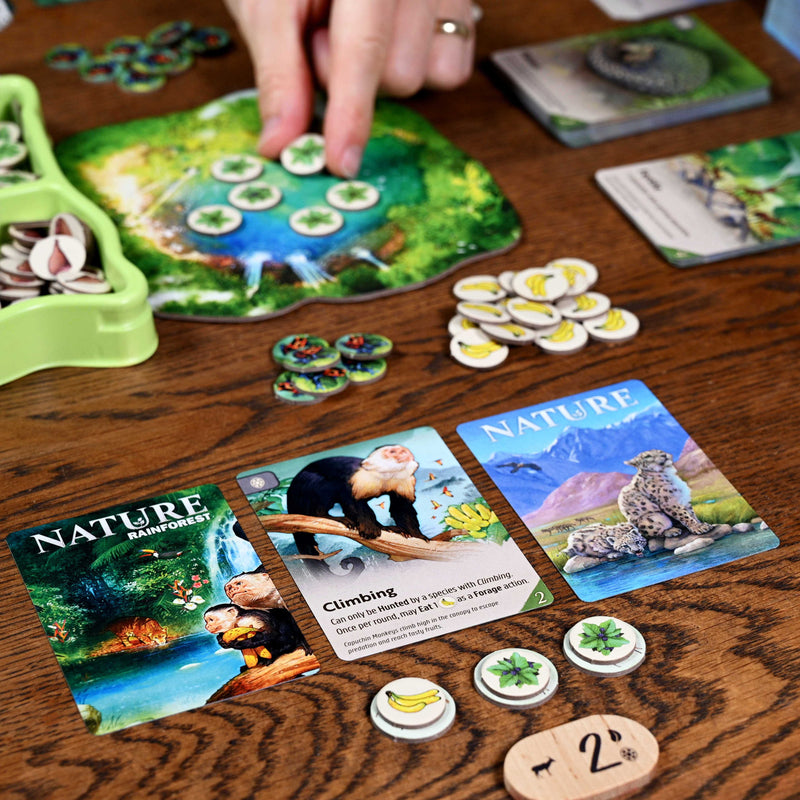
Discover Nature - Episode #2
Nature is our new ecosystem board game, launching on Kickstarter in September 2024. Discover how we created Nature in this behind-the-scenes series.
- Discover Nature - Episode #1: Evolution has Evolved
- Get Kickstarter Notification
- Nature GenCon Preview

So, what is Nature?
Let us bring you up to speed if you're new to Nature. In Nature, players experience a dynamic ecosystem where food is scarce and predators lurk. Adapt your species with traits like Fast to evade predators, Nesting to grow population, or Climbing to reach fruit high in the canopy.
Nature is a modular game system that allows you to build and explore a unique ecosystem each time you play. Modules add new traits and mechanics, changing the core game. Add the Jurassic module to experience a world of giants or Natural Disasters for jaw-dropping events. Mix and match modules and create the perfect ecosystem for your game night.

Discover Nature - Episode #2
I’m Dominic Crapuchettes, founder of NorthStar and lead designer of Evolution, Oceans, and Wits & Wagers. Welcome to the second episode of an ongoing blog series about Nature.
The first blog in the series talked about the inspiration behind Nature and explained how the modular game system works. This blog shares my artistic vision for Nature and my design methodology for the game system.
My Theory of Nature
The theme of Nature takes place over hundreds of millions of years as species adapt to a continually changing environment. It isn’t easy to relate to such a vast expanse of time, so I have a theory that most people internalize the story as taking place over a lifetime. They internalize the story through their relationship with change rather than millions of years of evolution.

The game's tagline, "Adapt to the changing environment," deliberately embraces this ambiguity. Is it addressing the evolution of species over millions of years or our capacity to navigate life's shifting circumstances? Everybody must adapt to change, so I lean into this metaphor to make the game feel more personal. When I create a work of art, I want it to resonate with people as deeply as possible. I am passionate about science and evolutionary history because they help contextualize the human journey (and, therefore, my life).
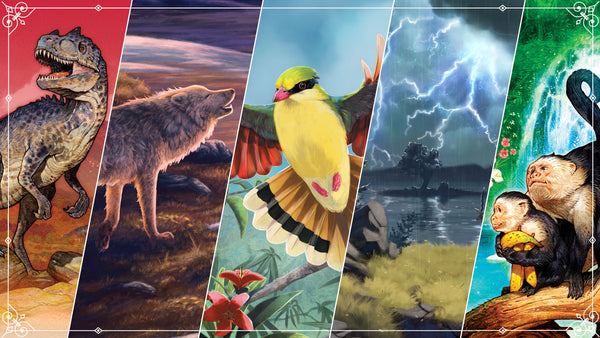
Games are as Diverse as Human Nature
Each person plays games for a different reason. Some like the tension and release of direct conflict. Some enjoy the peaceful solitude of problem-solving. Others like the excitement of risk-taking, bluffing, or exploring and discovering something delightfully unexpected.
Every module in Nature aims to reflect a different aspect of the human experience and appeal to a different gamer archetype. For instance, the Flight module appeals to players who avoid direct conflict in their games, while the Jurassic module appeals to players who seek out direct conflict. The Natural Disasters module appeals to gamers who care more about the memorable stories created by a game than who wins. The diversity of these experiences creates interesting dynamics when the modules are combined.
Welcome to the diversity of Nature!

Waiting to be Discovered…
The most exciting thing about Nature is combining the modules and exploring the variety of experiences they offer. Even after hundreds of playtests of the individual modules, I am continually surprised by the synergies I discover when combined. Every module is a well-curated experience, but most combinations are organic and wild—untouched by human hands and waiting to be discovered!

The Base Set
Since every module combines with the base set Nature, it’s critically essential for it to provide a solid foundation for the entire system. My son and I tested the first Nature prototype in 2019. Since then, I have created and tested 53 different versions of the base set! Several of the latest versions have been tested hundreds of times each.
The Nature traits needed to be simple enough to teach to new players, but fertile enough to provide exciting synergies when they are combined with new traits. Additionally, the traits in the base set can’t create complicated exceptions when they synergize with other traits. They have to be clean and robust.
I soon realized that if I wanted to reduce the number of traits in the base set to less than ten, they had to be additive, meaning an additional copy of the same trait would need to add an additional benefit. This increased the number of unique species in Nature from 1,572 to 2,308, which significantly increased the variety it provided.
Fun Fact: there are over 28 trillion potential game states at the end of round one!

Over 28 trillion game states is a mind-boggling number, but what matters is the number of viable game states that can occur when four good players play the game. The base set took a big leap forward from version 39 to version 40 when a card called Tusks was added to the set which increases in value when the food supply is low. It’s a counterbalance to a card called Opportunistic that increases in value when the food supply is high, creating an axis I could manipulate with the modules.
Tusks and Opportunistic synergize with a third card called Social, amplifying each effect. The interaction of these three cards is one of the main strategic axes of Nature. By modifying the food supply in the modules, I can push the ecosystem in one direction or another. The other strategic axis in Nature is the prevalence of predators, which, again, I can amplify or diminish with the modules.

My Modular Design Process
When designing a module for Nature, I choose a theme that resonates with our audience. There is a poll on BoardGameGeek.com where hundreds of people have rated 30 new module ideas based only on their names. By actively listening to the community, we can release concepts that a wider audience will love.
Next, I focus on understanding our audience's emotional connection with the leading concepts. Understanding why people are drawn to specific ideas allows me to design a module to live up to their excitement. I don’t create any game mechanics until I understand the emotional experience I want the double to provide. I want the game mechanics to be as fresh and exciting as possible, but they are always subservient to the experience. It’s this core emotional experience that makes each of the modules distinct and unique.

Creating simple rules to describe complicated phenomena is one of the most significant challenges in designing a scientific game. For each module, I spend 10 - 50 hours researching scientific angles I can communicate with a simple game mechanic. During this process, I write down all of the words that people associate with the concept so I can turn the strongest touch points into trait names. The Nature development team starts testing the module when I have a scientific angle, a core game mechanic, and five viable traits that can evoke the core emotional experience.

The first playtest is always disastrous! It’s not unusual for everyone to think nothing was redeeming about the experience - everyone but me. I usually leave feeling excited about how to uncover my vision for the module better. By the third iteration, others are generally having fun with the module.
The initial goal of playtesting is to nail down the game architecture and the core emotional concept. I don’t want to waste time balancing the cards if the module is too tricky to explain, doesn’t evoke the correct emotion, or if the gameplay isn’t fun. Some early versions are only tested once or twice before a concept is scrapped. Once the game architecture and the core emotional concept are solidified, we’re ready to start the time-consuming prospect of balancing the cards. This is where the vast majority of the design time lies.

Balancing the Modules
A module must have impactful traits. Otherwise, the experience of adding a new module is anti-climatic. It’s also critical for the traits to be balanced. Otherwise, players will quickly find a dominant strategy.
I have three major goals when I design a module. First, I want every module trait to get played in every game. Second, I don’t want any of the module traits to be dominant. Third, when playing with experienced players, I want 50% of the traits used in each game to be from the module and 50% from the core Nature deck. The decision space explodes when we get these three things right.
It’s not easy to introduce a new set of cards into an ecosystem and arrive at a balanced system. If it’s designed correctly, the new cards will increase the value of some cards in the base set and decrease the value of others. If this doesn’t happen, it means the cards don’t have synergistic interaction, which is terrible for an ecosystem game. Part of the fun of exploring a new module is discovering how the new environment changes the value of the traits you have grown to understand.

Balancing actions in a resource conversion game is relatively simple compared to balancing cards in an ecosystem game. Resource conversion games can be balanced in a spreadsheet by ensuring every conversion path leads to the same expected point value. This is not possible with Nature, where the value of each trait depends not only on how it synergizes with your other traits but also on how the combination of traits synergizes with the combinations of traits used by the other players. In Nature, the value of a trait changes from turn to turn, sometimes getting better and sometimes getting worse, depending on what the other players do on their turns.
So, how do you balance cards in such a dynamic ecosystem? My design methodology uses some math and lots of data from playtests. I aim for every trait to get used equally by the winners when you look across thousands of games worth of data. Yes, thousands of games worth of data!

Thousands of Games Worth of Data
One of the most significant benefits of working at an established company is having access to a robust team of fans and playtesters. When we balanced Oceans, we had over two thousand games worth of data from the external playtest community, but this is nothing compared to Nature. Nature had a fully functional digital implementation with a good AI before the base set was developed, allowing us to analyze vast amounts of data from thousands of beta testers. This was only possible because the Nature app was built on the back of the Evolution app developed a decade ago.

The office has a fun story about how the first Nature AI broke the game. It didn’t really break the game, but it did find a way to be highly competitive with only 4 of the 10 traits. The AI was easy to counter once you knew what to expect, but the fact that a “degenerate” strategy was mindlessly simple to emulate put the base game back into development for several months to rebalance the cards. Having the good fortune of machine learning AI to help balance a game has been eye-opening as to what the future holds.
Be the First to Play Nature
You can sign up to be notified when it goes live on Kickstarter, or better yet, play it now on TTS or with your own Print & Play. We’d love to hear your thoughts!

My Next Blog in this Designer Series
In my next blog, I’ll explore two modules that pull Nature in very different directions. The Jurassic module is designed for people who enjoy head-to-head competition, and the Flight module is for those who avoid conflict in their games.
We Need Your Help
Help us bring attention to Nature by clicking on the green thumb next to Nature in the GenCon Preview. This would be very helpful. Thanks!
Links
- Discovering Nature - Episode #1
- Get a Kickstarter Notification for Nature
- Nature GenCon Preview
- Learn and Play Nature at GenCon
- Nature Rulebooks
- Print & Play Files
Let Us Know Your Thoughts
Where would you like to see the Nature game system develop? Are there any themes or ideas you'd like to see introduced? We'd love to hear your thoughts on these and more in the comments below or join our Discord Community.

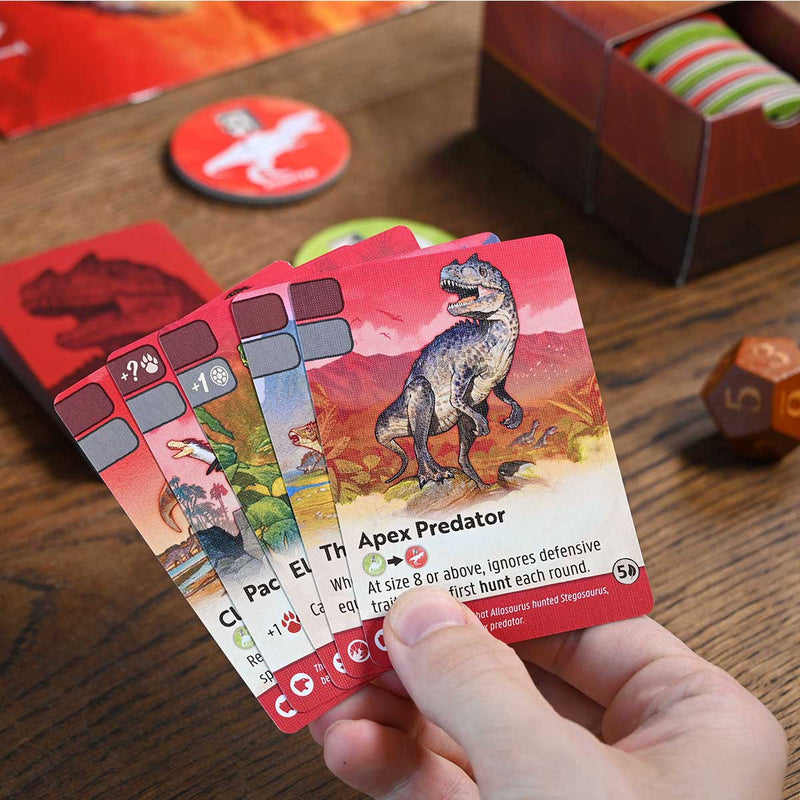
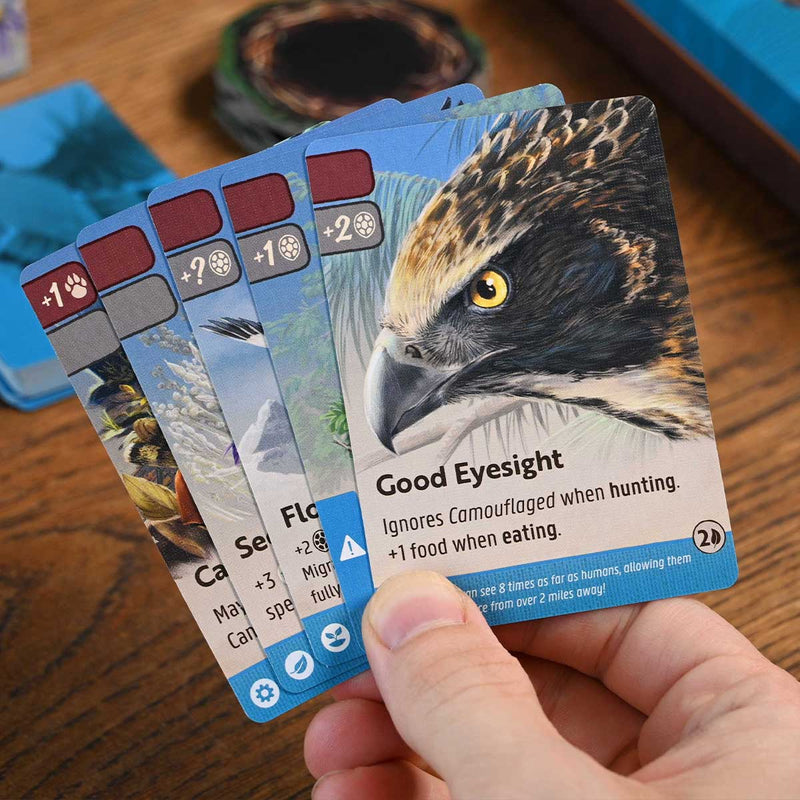
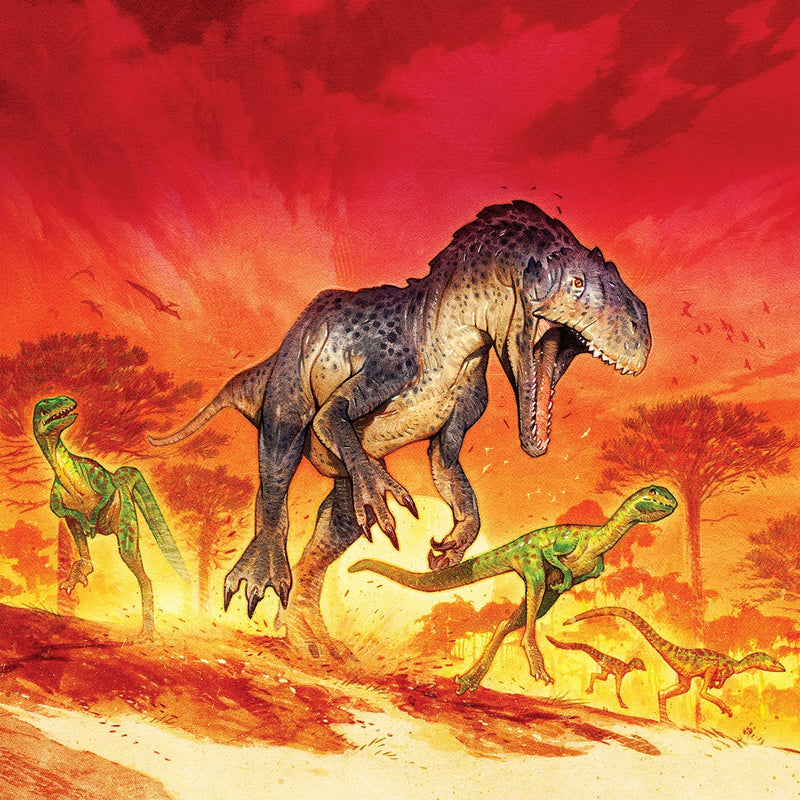
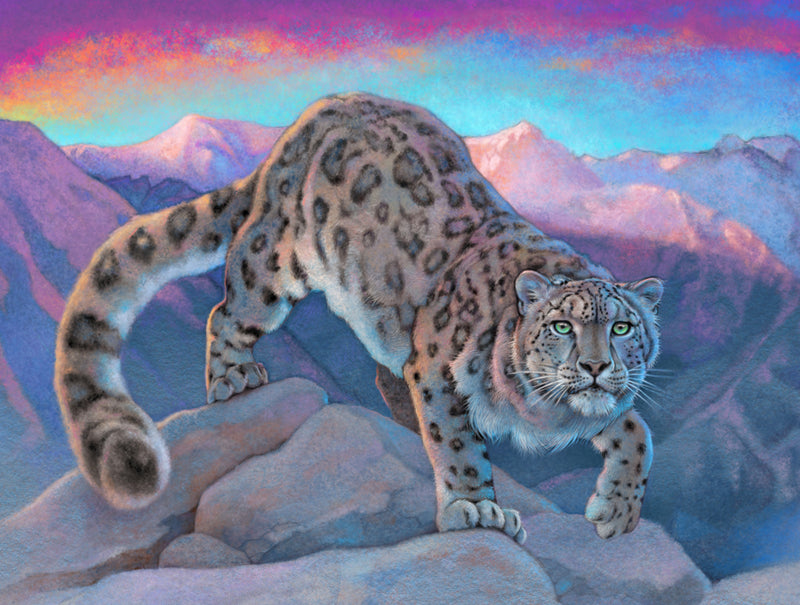
@Chrondeath – I kinda have to agree with you. Nature is leagues better than Evolution, but it can’t top Oceans.
What do I like about Nature?
Oceans can be a pretty long game and it’s hard to gauge how long it’ll take. Nature ends in a set number of rounds which ends up being useful if you only have a set time to play. In Evolution you have to discard a card to get a new species, but in Nature you get one for free after every round. Like Dominic said in another comment, anything you lose in a round will be given back to you in the next. The most fun I have with Nature is trying out each of the modules and finding out which ones are my favorite. We haven’t tried them all but my brother and I are fans of Natural Disasters for it’s chaotic variety.
How does Nature fail against Oceans?
For me, the most important thing a board game can have is infinite replayability (One of the reasons I hate Chess). This blog mentions how there are 2,308 possible species in the base set of Nature but Oceans blows that number out of the park. My favorite thing about Oceans is the 120ish unique deep cards. This guarantees that you will need to come up with different strategies each game. In the few games of Nature I played with my brother, we always ended up with at least one identical species, usually social opportunistic scavengers.
Why am I backing Nature?
I’m backing Nature for 2 reasons. Reason 1: The one thing Oceans doesn’t have that Evolution does is a climate tracker. Every player tossing in 1 card to try and turn the climate to their favor makes for an interesting dynamic. I’m backing Nature so one day I can get the climate module and play a better version of Evolution: Climate (Also the insect module because I’m a sucker for bugs.) Reason 2: I’m a collector and can’t help myself, the game looks really neat.
This probably doesn’t help you decide whether to back it or not, but an essay is really fun to write if school isn’t forcing you to.
@Matthew Colwell – Players can evolve into predators and hunt other species. That’s inherent in any good simulation of an ecosystem. We mitigated the viability of predators in the base game, but they come out in most games to feed on the weaker species, and sometimes a dominant predator will find a niche in the ecosystem.
On the flip side, I took special care to make the impact of being hunted as minimal as possible. Any resource that you lose in a round (to starvation or predation) will be returned to you in the following round, allowing you to rebuild differently for the next round. In other words, everyone at the table always starts each round with the same total number of resources, regardless of whether they played poorly in the previous round.
I can’t say whether that will tip the scales for you or not. It does tip the scales for a lot of people, which makes me happy, but I have also come across people where it doesn’t.
How much take that is in the game? I avoided evolution and oceans because of the take that nature of those games.
@John Sperry – I’d be happy to play with you at the office in Kensington on any Thursday. We will also run events at the Game Kastle, the Board and Brew, and Labyrinth when we get closer to the Kickstarter in September.
@Chrondeath – Nature is my grail game. It’s everything that I wanted Evolution to be. Nature captures the experience I had as a pro Magic player in the 90s; a world of limitless possibilities where I could discover things no one had yet discovered – not even the game designer. Nature provides this experience in a game that is easy to teach, has an accessible theme, and doesn’t require your life’s savings.
What is different about the experience? Lot’s of things! Nature doesn’t provide one experience. Each module provides a unique experience. Each modules is highly curated experienc that has been tested thousands of times, but the game system truly shines when you start combining the modules. That’s when you can discover fascinating synergies that are accidental consequences of the curated worlds I’ve created.
Adding the Jurassic module is like adding hot sauce to a dish. Adding the Natural Disasters module is like adding sugar. The Flight module is an exotic fruit from the rainforest. Mixing and matching these modules to see what they taste like, or to create the perfect dish for the people you’ve invited over for game night… That’s where Nature shines.
i would love to test the print&play but didnt find the card images in the linked googledrive
Best regards
So far I’m missing the pitch for why I need this game if I’ve already played Evolution and Oceans. Okay, there’s a lot of modules, but what is going to be different about the basic experience? Oceans felt worth backing even with Evolution because some of the basic changes (anything can bite anything, difficult to extinct a species) felt like they would directly address issues that were stopping my group from playing Evolution more often. What is the equivalent pitch here?
Can’t wait to play this in person. Have played a few games digitally but would love to get hands on if you do any DMV (DC) area testing.